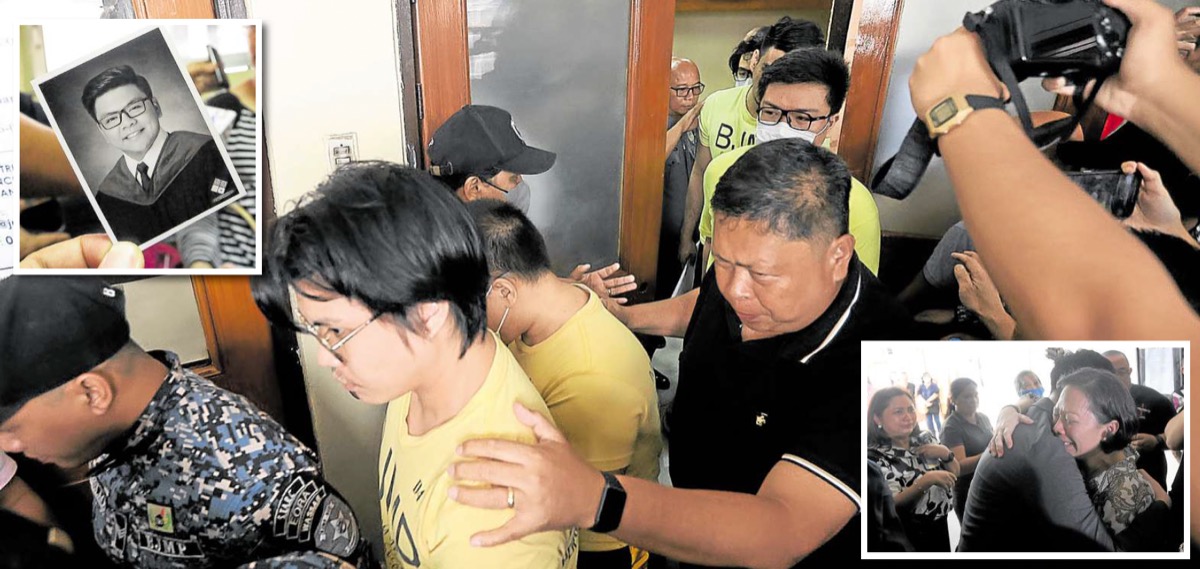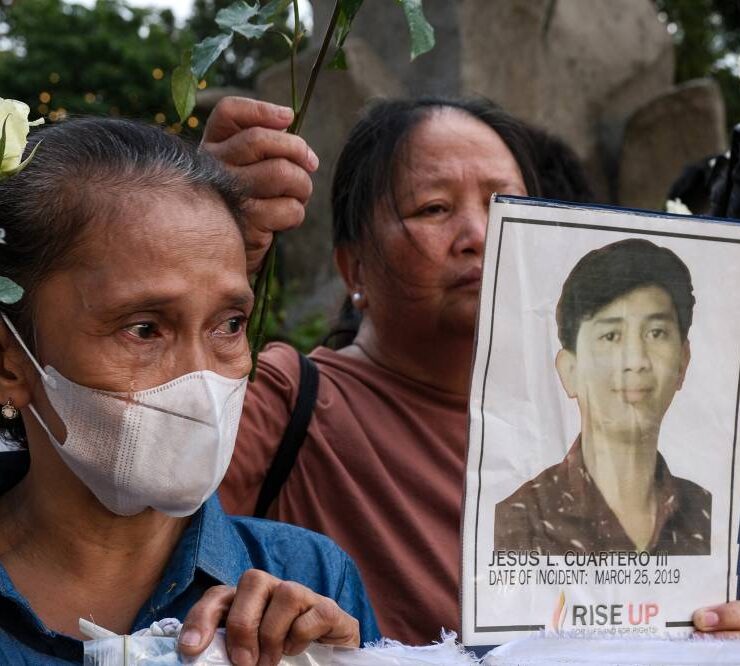10 frat men get 40 years for deadly Castillo hazing

Seven years after the death of University of Santo Tomas (UST) law freshman Horacio “Atio” Castillo III due to fraternity hazing injuries, a Manila court found 10 of his Aegis Juris upperclassmen guilty on Tuesday, sentencing each to up to 40 years in prison.
The men were convicted of violating the Anti-Hazing Act of 1995 for their participation in the 2017 initiation rites that proved fatal for Castillo.
The case triggered public outrage and led to congressional action that amended and gave more teeth to the hazing law a year later.
Castillo, then a 22-year-old student at the UST Faculty of Civil Law, succumbed to severe injuries he sustained during a fraternity activity in September 2017, according to case records.
Held responsible for his death were then Aegis Juris president Arvin Balag, Oliver John Audrey Onofre, Mhin Wei Chan, Danielle Hans Matthew Rodrigo, Joshua Joriel Macabali, Axel Munro Hipe, Marcelino Bagtang, Jose Miguel Salamat, Ralph Trangia and Robin Ramos.
According to a decision promulgated on Tuesday by Judge Shirley Magsipoc-Pagalilauan of the Manila Regional Trial Court Branch 11, they will each serve a sentence of reclusion perpetua, or a prison term of 20 to 40 years.
The 1995 antihazing law was amended in July 2018 by Republic Act No. 11053, which imposed tougher penalties on perpetrators of fraternity-related violence.
The 10 convicts in the Castillo case, however, were meted penalties under the older law.
They were also ordered to pay the victim’s family P461,800 in actual damages; P75,000 in civil indemnity; P75,000 in moral damages, and P75,000 in exemplary damages.
All amounts will accrue interest at a rate of 6 percent per year from the finality of the decision until fully paid, the court said.
“The untimely death of Atio caused pain, agony, anxiety, suffering and mental anguish to his heirs because it deprived them of his company, love, support and companionship,” Pagalilauan said in her decision.
Exemplary damages were warranted, she added, as evidence revealed aggravating circumstances.
“The hazing was committed outside of the school or institution,” the ruling noted.
Speaking to reporters after the decision was read, Castillo’s mother, Carmina, gave an emotional plea as she also held UST accountable for her son’s death.

Failure ‘as 2nd parents’
“It has been proven that Aegis Juris has been practicing hazing, and it is time to reassess your policies and laws. I want to emphasize that the school, the university, the civil law department, and the dean himself failed to protect our son,” she said.
The university, she said, must make changes after “failing as [the] second parents” of young men like her son.
“The dean himself should have acted sooner,” she said.
In response, UST law dean Nilo Divina, an alumnus of Aegis Juris, defended the school, saying UST and its faculty had consistently upheld policies to promote the safety and welfare of all students.
“Unfortunately, no institution is immune to individuals who choose to disregard these measures. We remain committed to ensuring a safe environment and will continue improving our efforts to prevent such tragedies from happening again,” Divina said in a Viber message.
Left on sidewalk
Castillo was found unconscious and covered by a blanket on a sidewalk in Tondo, Manila, on Sept. 17, 2017. His arms were badly bruised, while candle wax drippings marked other parts of his body.
He was later taken by a man to the Chinese General Hospital, where he was pronounced dead on arrival. A police autopsy later showed that he died of a massive heart attack.
On Sept. 25, the Manila police filed complaints for murder, obstruction of justice, perjury, robbery, and violation of the antihazing law against 18 Aegis Juris members at the Department of Justice.
John Paul Solano, an Aegis Juris member who surrendered to the authorities after being identified as the one who had brought Castillo to the hospital, was among those initially investigated.
Only 10, however, were charged in court based on their direct participation in the initiation.
In October 2017, Castillo’s parents filed a supplemental complaint against 18 more members of the fraternity, including Divina. It was later dismissed for lack of evidence.
In 2019, Solano was found guilty of obstruction of justice and sentenced to up to four years in prison.
ROTC revival
The Manila court’s decision came days after Senate Majority Leader Francis Tolentino reported President Marcos’ order to expedite the passage of a bill reviving the mandatory Reserve Officers’ Training Corps (ROTC) program in colleges and universities, where hazing had also been known to occur.
The program was abolished in 2001 following public outrage over the killing of another UST student, Mark Welson Chua, who had exposed corrupt practices in the university’s ROTC program.
Sen. Juan Miguel Zubiri expressed confidence that the Manila court’s decision would help end fraternity-related violence in the country.
“May this verdict against (Castillo’s) killers serve as a stern warning against all fraternities and organizations that still refuse to end their culture of hazing,” Zubiri said in a statement.
“The recent verdict is a clear message that no one is above the law—those who perpetrate such acts will face justice,” he said, adding: “The law will find you and you will pay for your crimes.”
Zubiri noted that Congress amended the antihazing law following Castillo’s death in its effort to “put a stop to the barbaric hazing practices that have taken too many young lives.”
Sen. Sherwin Gatchalian also welcomed the ruling against the Aegis Juris fraternity members.
“[T]oday marks a victory for the rule of law against the evil of hazing,” Gatchalian said, adding:
“Alongside the pursuit of justice for other hazing victims, we must also ensure that our institutions, including schools and law enforcement agencies, work diligently to eliminate hazing.” INQ





















